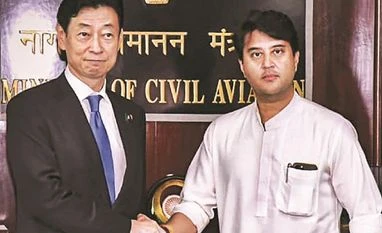Japan is keen to invest ¥5 trillion, or about Rs 2.95 trillion, in India across various sectors, including steel, Union Minister Jyotiraditya Scindia said on Thursday.
The two countries also signed a memorandum of cooperation (MoC) in semiconductors focused on key areas like research and development (R&D), manufacturing, design, and talent development. The pact was signed during a meeting of top Indian government officials with a Japanese delegation led by Nishimura Yasutoshi, minister of economy, trade and industry of Japan.
The two countries also signed a memorandum of cooperation (MoC) in semiconductors focused on key areas like research and development (R&D), manufacturing, design, and talent development. The pact was signed during a meeting of top Indian government officials with a Japanese delegation led by Nishimura Yasutoshi, minister of economy, trade and industry of Japan.
“We had a very detailed discussion...about the common strategies that we can develop in terms of the path forward, exchange of best practices, exchange of new technologies, Japanese investment in India, which would be close to 5 trillion yen...over the next few years, not only in the steel sector but other sectors as well," Scindia said.
Ashwini Vaishnaw, Union minister of communications and information technology said both countries will soon create an implementation organisation under the new pact for industry- and government-level collaboration. He added that Rapidus, the Japanese government-backed chipmaker, will be a major element of this partnership.
“Everybody wants a resilient semiconductor supply chain and in this, India and Japan are very important partners. The focus of this partnership is on finding complementary strengths of both the countries,” the minister said.
The announcement comes days after India and the US signed a Memorandum of Understanding (MoU) on semiconductor supply chain and innovation. Both Indian and Japanese governments have launched schemes to incentivise local manufacturing of semiconductors.
“The semiconductor industry will require a huge amount of talent and significant growth in multiple locations in the world. Japan sees India as a partner where complementary strengths can be used,” Vaishnaw added.
More From This Section
India’s $10 billion semiconductor production-linked incentive (PLI) programme offers 50 per cent incentive of the project costs for setting up a chip plant. On the other hand, the Japanese government had in 2021 announced a $6.8 billion scheme to boost its domestic chip industry.
Scindia said India and Japan will work closely with regards to the steel sector and said the delegation discussed tremendous growth prospects in India’s steel sector, which is to grow to 300 million tonne (mt) capacity by 2030 from 160 mt, at present.
Discussions were also held on the recent developments in the steel industry, the current global situation and its challenges, the minister added.
“Reaffirmed our commitment towards the Make in India program, along with partnerships in new domains, such as decarbonisation, green steel production and greater energy efficiency in the steel sector. Confident that the historical ties between the two countries will only see further strengthening in the future," the minister said in a tweet.
Later in a statement, the steel ministry said cooperation in the steel sector and decarbonisation issues were discussed in the meeting.
Recognising the recent expansion of investment activities in India by Japanese steel producers, both sides decided to support the cooperation between the public and private sectors of the two countries, which will lead to appropriate development of the global steel industry, it said.
"Both sides affirmed the importance of cooperation for achieving their respective net zero goals, recognizing the heterogeneity of steel decarbonization pathways. In order to continue such cooperation, both sides decided to hold further discussions through the Steel Dialogue and other cooperation programs," the statement said.
)